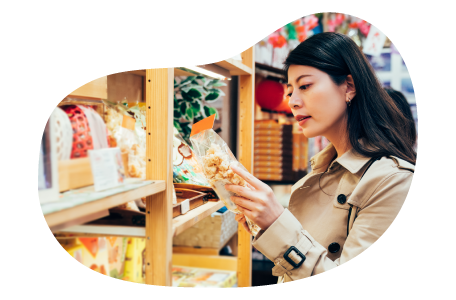
Why do gourmet and specialty food stores need insurance?
Your shop carries a wide range of high-quality, unique foods sought by your customers. However, every product comes with risk. Business insurance covers costs if a customer suffers an allergic reaction or food poisoning. It can also pay for data breaches, auto accidents, and injuries.

Find affordable insurance
With Insureon, specialty food store owners can compare quotes from top-rated insurance companies.
A licensed insurance agent will help make sure you get the right coverage at a price you can afford.
What types of insurance do specialty food stores need?
These insurance policies cover the most common risks faced by gourmet and specialty food stores.
Business owner's policy
A business owner's policy, or BOP, is a cost-effective way for owners of specialty food shops to buy general liability coverage and commercial property insurance together.
- Illnesses caused by contaminated food
- Damaged or destroyed inventory
- Business interruption coverage
General liability insurance
This policy covers third-party lawsuits stemming from customer injuries and property damage. For example, a customer might suffer an allergic reaction from a mislabeled product.
- Customer bodily injuries
- Product liability claims
- Libel and other advertising injuries
Workers’ compensation insurance
Most states require workers' comp as soon as a specialty food business hires its first employee. It also protects sole proprietors from work-related medical bills that health insurance might deny.
- Employee medical expenses
- Disability benefits
- Workplace injury lawsuits
Cyber insurance
This policy helps specialty food shops recover financially from data breaches and cyberattacks. It’s sometimes referred to as cyber liability insurance or cybersecurity insurance.
- Customer notification expenses
- Fraud monitoring services
- Cyber extortion demands
Commercial umbrella insurance
Umbrella insurance boosts coverage on a gourmet food business's general liability, employer’s liability, or commercial auto insurance policy once the limit is reached on a claim.
- Customer injury lawsuits
- Employee injury lawsuits
- Auto accident lawsuits
Commercial auto insurance
This type of insurance covers accidents involving a specialty food store's delivery van or other vehicle. Each state has its own requirements for auto insurance.
- Injuries caused to another person
- Property damage caused by your vehicle
- Vehicle theft and vandalism
How much does business insurance cost for retail stores?

A small gourmet food shop with only a few employees won't have to pay a lot for business insurance.
Factors that affect food store insurance cost include:
- Products you sell, such as jam, pasta, cheese, meat, seafood, or wine
- Whether you have a brick-and-mortar business or an e-commerce business
- Business income
- Business location
- Policy limits and deductibles
- Coverage options, including any additional insureds
- Claims history
How do I get specialty food store insurance?
It's easy to get business insurance for your gourmet shop or specialty food store if you have your company's information on hand. Our application will ask for basic facts about your store, such as revenue and number of employees.
You can buy a policy online and get a certificate of insurance with Insureon in three easy steps:
- Complete a free online application.
- Compare insurance quotes and choose policies.
- Pay for your policy and download a certificate.
Insureon's licensed insurance agents work with top-rated U.S. providers to find the right insurance coverage for your specialty food business, whether you work independently or hire employees.
Verified business insurance reviews
Hear from customers like you who purchased small business insurance.
FAQs about business insurance for gourmet and specialty food stores
Review answers to frequently asked questions about insurance for stores that sell gourmet and specialty foods.
Do specialty food stores need product liability insurance?
Yes, your products are one of the biggest liabilities at a specialty food store, which is why you need product liability insurance.
This policy covers a wide range of product lawsuits, such as:
- A customer has an allergic reaction to a mislabeled snack mix that contains nuts.
- A jar of contaminated jam gives a customer food poisoning.
- A customer gets sick after eating spoiled scallops purchased at your store.
- A manufacturing defect leaves a sharp edge on a jar that cuts a customer.
Product liability insurance covers legal costs when a product sold at your store causes a bodily injury or damages someone's property. Because food-borne illnesses and allergic reactions are common, this is one of the most important policies for any food business.
If a customer sues your shop to recoup costly medical bills or other damages, the resulting legal bills could bankrupt your small business. Even if you weren't responsible for the product defect that caused the issue, you could still be held liable. That's why retailers, manufacturers, wholesalers, and distributors all need this coverage.
Fortunately, when you buy commercial general liability insurance or a business owner's policy it usually includes product liability insurance.
Does specialty food store insurance protect against theft?
Yes, you can buy insurance products that provide financial reimbursement for theft and other property losses. Here are the most common types of insurance that protect against theft:
- Commercial property insurance covers smash-and-grab burglaries, vandalism, and similar crimes that damage or destroy business property. It also covers damage from fires, storms, and burst pipes. You can save money by bundling it with general liability insurance in a business owner's policy.
- Commercial crime insurance protects against losses caused by dishonest employees, such as cash register theft or stolen specialty foods. You can usually add it to your property policy or BOP.
Property claims cause your premium to go up, which is another reason it's best to prevent theft in the first place. Sometimes insurers even offer a discount when you install an approved security system or take other recommended steps.
Is food poisoning covered by specialty food shop insurance?
Yes, the product liability coverage in your general liability policy protects your business from food poisoning claims due to undercooked, spoiled, or contaminated food.
However, it won't cover the cost of replacing perishable goods that spoil due to a prolonged power outage or a malfunctioning freezer. Without additional protection, you might have to pay out of pocket for all of the destroyed food, and the cost of restocking your shelves.
For this type of coverage, look to food contamination and spoilage insurance. This policy helps pay for loss of inventory if your refrigerator breaks, or if an extended power outage forces you to throw away defrosted or potentially spoiled goods.
You can typically add this coverage to your business owner's policy or commercial property policy as an endorsement.
What other types of insurance policies should gourmet and specialty food stores carry?
Specialty food store owners should consider several other types of insurance as part of their risk management plan. That includes:
- Business income insurance: This policy covers employee wages, rent, lost income, and day-to-day expenses when your store is forced to close due to damage from a fire, storm, or other covered property claim. It's also called business interruption insurance.
- Equipment breakdown insurance: If a refrigerator, point of sale device, or other piece of equipment fails unexpectedly, this policy can help pay to repair or replace it.
- Electronic data processing insurance: This policy protects against financial losses related to data loss on computers, backup drives, operating systems, network storage servers, and other eligible devices.
- Liquor liability insurance: If a customer who became intoxicated at your business goes on to harm someone or damage their property, this policy will pay for any resulting legal expenses.
- Product recall insurance: Cheese shops, specialty grocers, and gourmet food shops can face significant losses when a product is recalled. This policy helps cover costs related to removing defective products and notifying customers about a product recall.
If you have questions or need help finding the right insurance solutions for your risks, chat with a licensed agent today.
